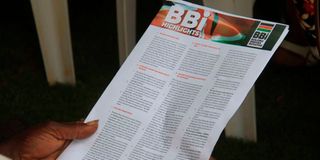Referendum is embodiment of people’s power

A copy of the BBI report.
What you need to know:
- After the passage of the BBI Bill by a majority of county assemblies, we are headed towards a referendum.
- The jury is out there and opinion is divided as to whether we should have a referendum.
We live in a democratic society where the participation of the people in governance is the bedrock of any legitimate government. Among the ways of the people’s participation is by referendum.
It is a creature of the law where registered voters exercise the right to approve or reject a legal proposal. Referenda are largely conducted to address political, social and economic needs of a particular politic.
The apparent physique, colour and body shape in a referendum is that it checks the pulse rate of any thriving democracy, but they are innately an elite agenda. An elite agenda for they, the elite, decide the referendum question, when, how to conduct it and possibly, what the results will be.
After the passage of The Constitution of Kenya Amendment Bill 2020 (BBI) by a majority of county assemblies, we are headed towards a referendum. The question is when and not if, presuming that the proponents do not abort. The jury is out there and opinion is divided as to whether we should have a referendum.
Globally, referendums are about major political reforms such as the Brexit in the UK in 2016, secession by South Sudan in 2011 and the adoption of the Constitution of Kenya in 2010.
Good or bad law
Referenda have also been used to legitimise dictatorial regimes such as the 1934 German Constitutional Amendment on the consolidation of the powers of the Office of the President and the Chancellor’s after President Paul Von Hindenburg died. This was meant to give Adolf Hitler supreme powers.
A referendum is only conducted when the law provides for it. In Kenya for instance, a legislative proposal to change the functions of Parliament or to amend the Bill of Rights must be subjected to a referendum. It is entrenched in our law that the basic structure of the Constitution can only be amended through a referendum.
Some states have had eccentric referenda amending non-basic legal issues. Switzerland was in the public limelight when it went into a referendum in 2010 on whether animals should have the right to legal representation in court by lawyers.
The crux of the referendum is its legality and the right of the people to participate in their own government through direct democracy. Referendums may bring forth a good law or a bad law. Kenyans must stay on guard.
Mr Kipkorir is a legal researcher. [email protected]





